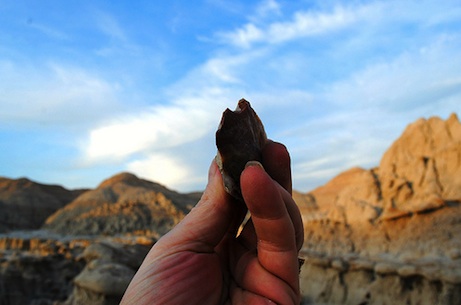
Victoria Tobolsky will be speaking at an international conference on her research into primitive tool making.
A Gates Cambridge Scholar will present her work on the possible relationships between nut-cracking behaviour in chimpanzees and the possible origins of the oldest stone age technologies at an international conference this week.
Victoria Tobolsky will speak at the Unravelling Human Origins conference in Cambridge on Friday.
She will be presenting a chapter of her undergraduate senior thesis, “Getting a Grip: Precision, Technological Evolution, and Hominin Evolution”, which was co-awarded the Senior Thesis Prize in Anthropology by a panel of professors. Her presentation is titled “Man the Tool-Modifier: Potentially Primitive Origins for the Oldowan.”
Victoria [2012], who is doing an MPhil in Human Evolutionary Studies, is studying the evolution of bipedality and is currently focusing on how this relates to birth. She says: “In this project, I studied how bipedality related to the evolution of the hands. Rising from a quadrupedal to a bipedal stance allowed for specialisations in the hand unrelated to locomotory function, namely, those useful for manipulation. Advanced tool use as seen in our species is in part predicated upon our ability to walk upright, so in studying the evolution of bipedality, and the hand, I began to theorise how tool use might have taken such a leap in our evolutionary history.”
It was previously thought that humans were the sole tool user on earth, but this is no longer considered the case. Victoria’s research suggests the propensity for tool use may possibly find very primitive roots in the primate lineage. She says: “It is likely that an ancient hominin cracking nuts produced incidental flakes, as do chimpanzees. That it saw its potential as a cutting implement, as have extant primates species like capuchins, and grasped the concept of lithic reduction, as has been proposed for bonobos, does not seem out of the behavioral repertoire of early hominins. Intentional flake production in the Oldowan [the earliest stone tool industry in prehistory] may have begun following these activities.”
The conference is part of a series which aims to create a platform for stimulating discussion of current research on human origins and the Palaeolithic, by bringing together scholars from a wide range of disciplines including archaeologists, archaeological scientists, biological anthropologists and social anthropologists. The conference series is a joint venture between the Universities of Southampton, Oxford, Liverpool, Sheffield and Cambridge.
January’s conference is hosted by the Department of Archaeology and Anthropology, which includes the Divisions of Archaeology and Biological Anthropology, the Leverhulme Centre for Human Evolutionary Studies and the McDonald Institute for Archaeological Research.
Picture credit: Creative Commons and Yakkhapadma.












